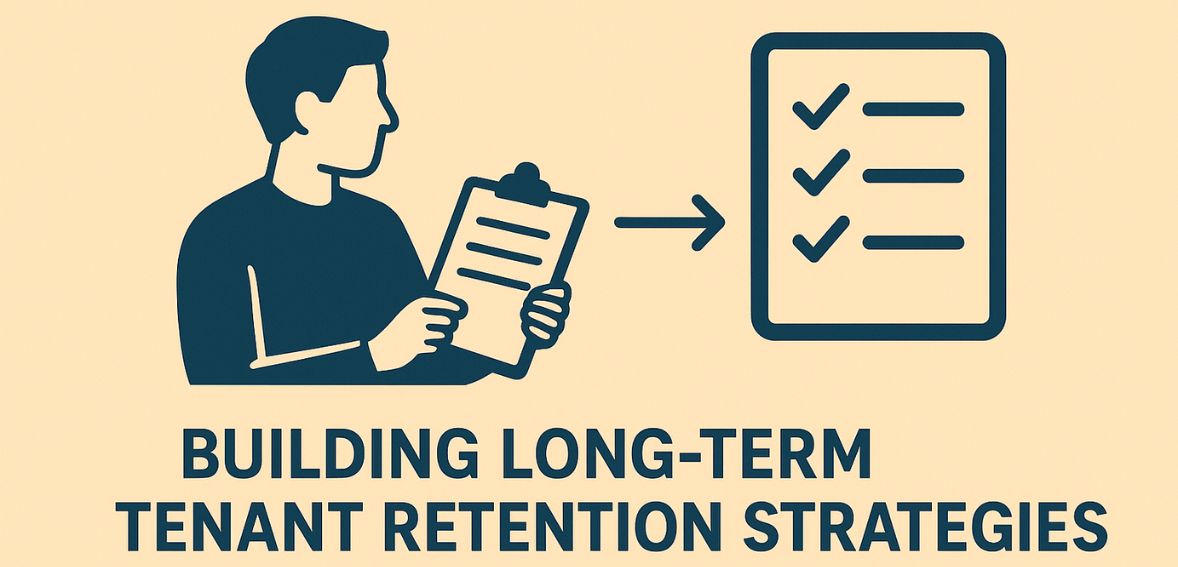
By ndg302 August 24, 2025
For property owners and managers, keeping tenants happy enough to stay long term matters more to business success than just filling empty units. Holding on to tenants provides stability, reduces the high costs of turnover, and helps build a community that benefits both residents and owners.
The landlord must deal with maintenance expenses, lost rental income, advertising expenses, and the uncertainty of finding a trustworthy replacement each time a tenant vacates. However, when tenants feel comfortable and safe in their homes, they are more likely to renew their leases, take good care of the property, and even refer others to it.
Creating meaningful experiences where people feel appreciated, respected, and understood is more important for long-term tenant retention than using gimmicks.
Creating a Positive First Impression

Even before a tenant moves in, the process of retaining them over the long term starts. Establishing trust early on is made possible by a well-kept property, open communication throughout the leasing process, and a professional yet approachable manner. Tenants are more likely to consider the property as a long-term residence rather than merely a short-term arrangement if they feel accepted during their initial interactions.
Details count: a tidy apartment, prompt responses to preliminary questions, and a seamless leasing procedure give the sense that management takes ownership. Tenants’ future consideration of renewing their lease is frequently influenced by these initial interactions, which also set the tone for the entire relationship.
The Role of Consistent Communication
Strong relationships, including those between landlords and tenants, are built on effective communication. Tenants naturally develop trust when they believe they can contact them with ease and get prompt responses.
Communicating information proactively, whether it be a planned maintenance schedule, updates on property improvements, or reminders about lease renewal deadlines, is just as important as resolving issues as they come up.
Being clear, polite, and consistent with updates helps avoid confusion and shows tenants they can rely on management. Even in the face of sporadic annoyances, tenants who feel valued and heard are far more likely to remain.
Maintenance as a Retention Strategy

Taking good care of the property is one of the most obvious ways to show your tenants that you care. When neglected, minor problems like a leaking faucet, broken air conditioner, or pest problems can have a big impact on how renters view their living space. Tenants can tell that their comfort is a top priority when maintenance procedures are timely, effective, and transparent.
Regular upkeep matters just as much as fixing problems when they pop up. For landlords, understanding preventable maintenance can make the process more efficient and cost-effective. In addition to lowering emergency calls, routine inspections, replacements of outdated appliances, and enhancements to common areas give tenants peace of mind that they are appreciated.
A tenant is much more likely to feel comfortable extending their lease if they perceive that the property has been reinvested in.
Building a Sense of Community
Many tenants view a property as more than just a place to live; it is an integral part of their everyday lives, and the community greatly influences how satisfied they are. Tenant retention rates are frequently higher for property managers who designate areas where neighbors can interact.
Maintaining friendly common areas, planning seasonal get-togethers, or encouraging online resident groups are a few examples of small opportunities for interaction that can sometimes be just as important as throwing large events.
Tenants are more hesitant to move when they feel like they belong. When tenants feel connected to their community, moving isn’t just about finding a new apartment—it also means giving up a place where they feel at home.
Flexible Lease Options and Policies

Since each tenant has unique needs, strict lease provisions may occasionally cause them to leave unnecessarily. When it is reasonable, flexibility can greatly increase retention. Tenants may feel more at ease staying longer if, for example, month-to-month extensions, reasonable modifications within units, or renewal incentives are offered.
Policies that recognize life changes—like growing families, job moves, or financial struggles—go a long way toward building goodwill. Tenants are more likely to talk favorably about their experience, even if they are unable to stay for an extended period of time. This helps retention indirectly by improving the property’s reputation.
Offering Value Beyond Rent
When tenants believe they are getting more than just a room for their money, retention rates rise. Upgraded facilities, considerate services, or modest but sincere acts can all add value. Well-maintained outdoor areas, dependable internet connections, and energy-efficient appliances all provide noticeable advantages.
Remembering milestones like birthdays or anniversaries shows tenants they’re seen as people, not just as rent checks.
Creating Renewal Incentives
An important factor in retention is the time of the lease renewal. For hesitant tenants, providing incentives like small rent freezes, minor improvements, or loyalty benefits can make the difference. The cost of turnover frequently exceeds the investment needed to retain a tenant, even though property owners must balance financial returns.
Renewal perks send the message that management values their commitment and wants them to stick around. Landlords can lower turnover while preserving tenant satisfaction by establishing a win-win scenario.
Leveraging Technology for Convenience

Tenants expect technology to be a part of their rental experience because it has become an essential part of modern life. Daily life is made easier by online portals for lease management, maintenance requests, and rent payments. Tenants appreciate hassle-free financial management, and online portals for rent collection can significantly improve convenience.
Smart home features, automated reminders, and digital communication channels demonstrate how the property is adapting to the lifestyles of its tenants. Tenants are more likely to remain when convenience is included.
Consistency in Property Upkeep
One of the easiest ways to deter renewals is to show signs of decline in a property. Frequent maintenance—infrastructure upgrades, common area cleanliness, exterior repairs, and landscaping—shows that management values long-term quality.
When residents see steady investment in the property, they know the landlord cares about more than just collecting rent. Tenants are more likely to stay for years when they have that perception, which also promotes trust.
Building Personal Relationships
Policies and amenities are important, but when it comes to tenant loyalty, personal connections frequently make the difference. Real connections are formed by getting to know tenants by name, extending a personal greeting, and attending to their specific needs.
People are far less likely to move when they feel recognized as individuals instead of being treated like faceless tenants. Loyalty that is difficult to duplicate elsewhere is fostered by respect and acknowledgment.
Long-Term Value of Retention
Retaining tenants has far more financial advantages than lowering turnover expenses. Consistent cash flow, less administrative work, and a sense of community stability are all benefits of having stable tenants. Additionally, long-term tenants are more likely to maintain the property, take pride in their space, and recommend it to others.
Retention helps establish a property’s reputation because happy tenants promote it to others. Reputation can play a crucial role in maintaining low vacancy rates and attracting new residents in competitive markets.
Retaining tenants has far more financial advantages than lowering turnover expenses. It also improves cash flow and reduces vacancy risk, ultimately impacting net revenue retention, , which measures how well a business maintains recurring income over time.
Balancing Fair Rent Practices

One of the primary causes of tenant removals is rising rents. Even though changes are frequently required due to market trends, how these increases are managed makes a huge difference. When rent adjustments are gradual, transparent, and supported by unambiguous communication about enhancements or market conditions, tenants are more receptive to them.
Surprise rent hikes or vague explanations quickly break trust. Finding a balance between fairness and profitability is frequently necessary to retain tenants, making sure that increases are long-lasting for all parties. Tenants are far more likely to renew if they feel they are receiving fair treatment.
Quick Takeaways: Tenant Retention Strategies
- First Impressions Matter: Clean units, fast responses, and smooth leasing create trust.
- Communicate Consistently: Share updates, listen to concerns, and keep messaging clear.
- Prioritize Maintenance: Timely repairs and preventive care show tenants they’re valued.
- Build Community: Encourage resident interactions through events or common spaces.
- Be Flexible: Offer adaptable lease terms and renewal perks.
- Ensure Safety: Strong security measures boost peace of mind.
- Add Extra Value: Amenities, services, and personal touches foster loyalty.
- Handle Disputes Fairly: Resolve issues with empathy and patience.
- Maintain Transparency in Rent: Fair, well-explained increases retention trust.
- Invest in Long-Term Stability: Retention creates financial and community benefits.
Conclusion
Creating homes, not just rental units, is the ultimate goal of developing long-term tenant retention strategies. Making tenants feel safe, appreciated, and valued takes a combination of human interaction, practical management, and persistent work.
Every interaction influences a tenant’s decision to stay, from the initial impression to continuing correspondence, from resolving conflicts to providing incentives for renewal. Stronger communities and financial stability are unlocked when property managers and landlords see retention as an investment rather than a duty.
Offering tenants incentives to remain in one place is a significant benefit in a world where moving has never been easier. Treating tenants as partners in a shared living experience is the key for long-term tenant retention, not a one-time effort.